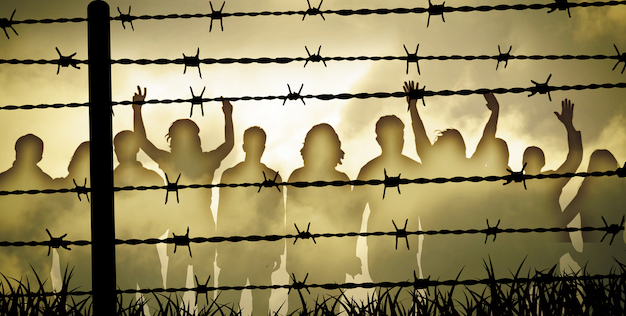Opinion
Reduce violence through healing and compassion
 Illustration of incarcerated men and women.(Image: Benjamin Haas, via Shutterstock)
Illustration of incarcerated men and women.(Image: Benjamin Haas, via Shutterstock)I am one of many survivors profiled as an “offender” instead of a victim. My prison sentence was preceded by years of trauma and violence.
Today, I am a member of the Justice for Survivor Act coalition (AB 124, authored by state Sen. Sydney Kamlager, D-Los Angeles). If passed, AB 124 would allow courts to consider an individual’s age, history of trauma, human trafficking history, intimate partner or sexual violence victimization, potentially reducing their criminal penalties.
This act is a step towards reducing the unjust criminalization of survivors, and a long-overdue reform to consider a more holistic approach during legal proceedings.
Our criminal justice system is broken and it is only amplifying the harm towards survivors.
Growing up, I frequently witnessed extreme conflict at home. When I was in elementary school, law enforcement raided my home and aimed their automatic assault weapons at me. By middle school, I began to have angry outbursts. At 19, I made the difficult decision of having an abortion that subsequently led to a deep depression. I used substances as a way to cope, often putting myself in unsafe situations. And by age 21, I had been sexually assaulted multiple times and sexually exploited for financial gain.
I was angry, depressed, and suicidal. Things only became worse when I entered into a toxic relationship. My boyfriend at the time was controlling, manipulative, and used physical violence as a form of punishment. Just seven months after we started dating, we were both arrested for assault and pimping charges.
There was no consideration for my mental state or my safety, or that of my family, despite the gang ties to my case.
In the end, I refused to cooperate because of those ties and the trauma bond between us and was ultimately charged as an accomplice and co-defendant. I spent the next two years fighting for my life in county jail. Despite my diagnosed depression and anxiety, I was only able to see a therapist once, and as a result, my mental health depleted. I was also placed in solitary confinement for weeks during this time. I was sentenced to a five-year term in state prison.
Two years after I came home from prison, I gained an understanding of how trauma had shaped my decision-making. It became clear that from my first experiences of violence, I became more likely to commit violence, as well as be more likely to experience re-victimization. According to a 2019 CDC study, the risk of violence lessens when trauma is addressed right away, as opposed to later in life.
Our criminal justice system is broken and it is only amplifying the harm towards survivors. The key to reducing violence and trauma is not in the continued arrest, conviction, and incarceration of vulnerable people, but in healing, compassion, and mental health services.
The Justice for Survivors Act does not absolve anyone of responsibility or accountability, but instead creates a more meaningful pathway toward justice. California’s existing laws do not allow judges to sufficiently consider people’s experiences of trauma, abuse, and exploitation. Courts need tools to help them provide justice and support for survivors. I urge all Californians to support AB 124 to help bring transformative justice to survivors like myself.
—
Editor’s Note: Adrianna Griffith is an Outreach Program Coordinator for the Women’s Center Youth & Family Services and lives in Stockton.
Want to see more stories like this? Sign up for The Roundup, the free daily newsletter about California politics from the editors of Capitol Weekly. Stay up to date on the news you need to know.
Sign up below, then look for a confirmation email in your inbox.

Leave a Reply